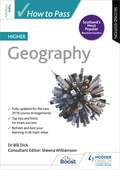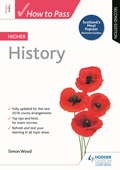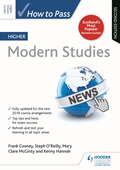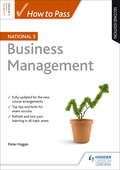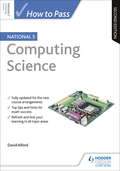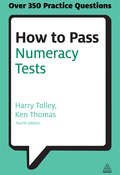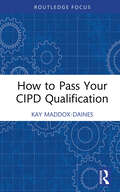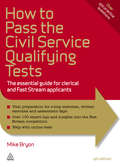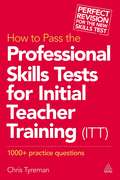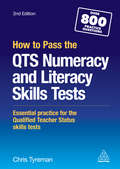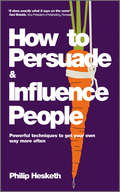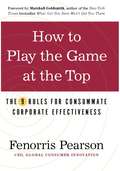- Table View
- List View
How to Pass Higher Geography, Second Edition (How To Pass - Higher Level)
by Bill Dick Sheena WilliamsonExam Board: SQA Level: Higher Subject: Geography First Teaching: August 2018 First Exam: May 2019Get your best grade with comprehensive course notes and advice from Scotland's top experts, fully updated for the latest changes to SQA Higher assessment. How to Pass Higher Geography Second Edition contains all the advice and support you need to revise successfully for your Higher exam. It combines an overview of the course syllabus with advice from top experts on how to improve exam performance, so you have the best chance of success.- Revise confidently with up-to-date guidance tailored to the latest SQA assessment changes - Refresh your knowledge with comprehensive, tailored subject notes- Prepare for the exam with top tips and hints on revision techniques- Get your best grade with advice on how to gain those vital extra marks
How to Pass Higher Geography, Second Edition (How To Pass - Higher Level)
by Bill Dick Sheena WilliamsonExam Board: SQA Level: Higher Subject: Geography First Teaching: August 2018 First Exam: May 2019Get your best grade with comprehensive course notes and advice from Scotland's top experts, fully updated for the latest changes to SQA Higher assessment. How to Pass Higher Geography Second Edition contains all the advice and support you need to revise successfully for your Higher exam. It combines an overview of the course syllabus with advice from top experts on how to improve exam performance, so you have the best chance of success.- Revise confidently with up-to-date guidance tailored to the latest SQA assessment changes - Refresh your knowledge with comprehensive, tailored subject notes- Prepare for the exam with top tips and hints on revision techniques- Get your best grade with advice on how to gain those vital extra marks
How to Pass Higher History, Second Edition (How To Pass - Higher Level)
by Simon WoodExam Board: SQA Level: Higher Subject: HistoryGet your best grade with comprehensive course notes and advice from Scotland's top experts.This revision guide contains all the advice and support that you need to revise successfully for your Higher History exam. It combines an overview of the course syllabus with advice from top experts on how to improve exam performance, so you have the best chance of success.> Refresh your knowledge with comprehensive, tailored subject notes> Prepare for the exam with top tips and hints on revision techniques> Get your best grade with advice on how to gain those vital extra marks
How to Pass Higher History: Second Edition Epub
by Simon WoodExam Board: SQA Level: Higher Subject: History First Teaching: August 2018 First Exam: May 2019Get your best grade with comprehensive course notes and advice from Scotland's top experts, fully updated for the latest changes to SQA Higher assessment.How to Pass Higher History Second Edition contains all the advice and support you need to revise successfully for your Higher exam. It combines an overview of the course syllabus with advice from top experts on how to improve exam performance, so you have the best chance of success.- Revise confidently with up-to-date guidance tailored to the latest SQA assessment changes - Refresh your knowledge with comprehensive, tailored subject notes- Prepare for the exam with top tips and hints on revision techniques- Get your best grade with advice on how to gain those vital extra marks
How to Pass Higher Modern Studies, Second Edition (How To Pass - Higher Level)
by Frank Cooney Steph O'Reilly Kenneth Hannah Mary Clare McGintyExam Board: SQA Level: Higher Subject: Modern Studies First Teaching: August 2018 First Exam: May 2019Get your best grade with comprehensive course notes and advice from Scotland's top experts, fully updated for the latest changes to SQA Higher assessment. How to Pass Higher Modern Studies Second Edition contains all the advice and support you need to revise successfully for your Higher exam. It combines an overview of the course syllabus with advice from top experts on how to improve exam performance, so you have the best chance of success.- Revise confidently with up-to-date guidance tailored to the latest SQA assessment changes - Refresh your knowledge with comprehensive, tailored subject notes- Prepare for the exam with top tips and hints on revision techniques- Get your best grade with advice on how to gain those vital extra marks
How to Pass Higher Modern Studies: Second Edition Epub
by Frank Cooney Steph O'Reilly Mary Clare McGintyExam Board: SQA Level: Higher Subject: Modern Studies First Teaching: August 2018 First Exam: May 2019Get your best grade with comprehensive course notes and advice from Scotland's top experts, fully updated for the latest changes to SQA Higher assessment. How to Pass Higher Modern Studies Second Edition contains all the advice and support you need to revise successfully for your Higher exam. It combines an overview of the course syllabus with advice from top experts on how to improve exam performance, so you have the best chance of success.- Revise confidently with up-to-date guidance tailored to the latest SQA assessment changes - Refresh your knowledge with comprehensive, tailored subject notes- Prepare for the exam with top tips and hints on revision techniques- Get your best grade with advice on how to gain those vital extra marks
How to Pass National 5 Business Management
by Peter HaganGet your best grade with the SQA endorsed guide to National 5 Business Management.This book contains all the advice and support you need to revise successfully for your National 5 exam. It combines an overview of the course syllabus with advice from a top expert on how to improve exam performance, so you have the best chance of success. Refresh your knowledge with complete course notes Prepare for the exam with top tips and hints on revision technique Get your best grade with advice on how to gain those vital extra marks
How to Pass National 5 Business Management, Second Edition
by Peter HaganExam Board: SQALevel: National 5Subject: BusinessFirst Teaching: September 2017First Exam: Summer 2018Get your best grade with the SQA endorsed guide to National 5 Business Management.Fully updated to account for the removal of Unit Assessments and the changes to the National 5 exam, this book contains all the advice and support you need to revise successfully. It combines an overview of the course syllabus with advice from a top expert on how to improve exam performance, so you have the best chance of success.- Refresh your knowledge with complete course notes- Prepare for the exam with top tips and hints on revision technique- Get your best grade with advice on how to gain those vital extra marks
How to Pass National 5 Business Management: Second Edition
by Peter HaganExam Board: SQALevel: National 5Subject: BusinessFirst Teaching: August 2017First Exam: May 2018Get your best grade with the SQA endorsed guide to National 5 Business Management.Fully updated to account for the removal of Unit Assessments and the changes to the National 5 exam, this book contains all the advice and support you need to revise successfully. It combines an overview of the course syllabus with advice from a top expert on how to improve exam performance, so you have the best chance of success.- Refresh your knowledge with complete course notes- Prepare for the exam with top tips and hints on revision technique- Get your best grade with advice on how to gain those vital extra marks
How to Pass National 5 Computing Science, Second Edition
by David AlfordExam Board: SQALevel: National 5Subject: Computing ScienceFirst Teaching: September 2017First Exam: Summer 2018Get your best grade with the SQA endorsed guide to National 5 Computing Science.Fully updated to account for the removal of Unit Assessments and the changes to the National 5 exam, this book contains all the advice and support you need to revise successfully. It combines an overview of the course syllabus with advice from a top expert on how to improve exam performance, so you have the best chance of success.- Refresh your knowledge with complete course notes- Prepare for the exam with top tips and hints on revision technique- Get your best grade with advice on how to gain those vital extra marks
How to Pass National 5 Computing Science: Second Edition
by David AlfordExam Board: SQALevel: National 5Subject: Computing ScienceFirst Teaching: August 2017First Exam: May 2018Get your best grade with the SQA endorsed guide to National 5 Computing Science.Fully updated to account for the removal of Unit Assessments and the changes to the National 5 exam, this book contains all the advice and support you need to revise successfully. It combines an overview of the course syllabus with advice from a top expert on how to improve exam performance, so you have the best chance of success.- Refresh your knowledge with complete course notes- Prepare for the exam with top tips and hints on revision technique- Get your best grade with advice on how to gain those vital extra marks
How to Pass Numeracy Tests
by Harry Tolley Ken ThomasHow to Pass Numeracy Tests will help you practice for timed tests, revise your maths and numeracy knowledge and improve your test technique. Providing over 350 practice questions it also gives vital advice on how the tests are marked and what you can do to optimise results. The wide variety of practice includes 20 timed tests on data interpretation, number sequences and number problems, covering percentages, averages, currency, decimals, whole numbers, multiplication and division as well as adding and substracting. With mental arithmetic starter exercises and a host of preparation techniques, How to Pass Numeracy Tests will help increase your confidence and beat the competition.
How to Pass Professional Level Psychometric Tests
by Sam Al-JajjokaHow to Pass Professional Level Psychometric Tests contains a wealth of practice questions to help prepare you for exactly the type of tests you will face in recruitment assessments for professional careers. A staggering 650 questions and answers, consisting of 20 timed practice tests reflect real life exams favoured by the most popular organisations. It is particularly useful for those facing aggressive psychometric tests, particularly candidates for careers in IT, management and finance. Also including practice questions for common verbal reasoning and numerical tests, How to Pass Professional Level Psychometric Tests provides essential help and preparation to improve your score and gain the competitive edge over the competition.
How to Pass Your CIPD Qualification
by Kay Maddox-DainesHow to Pass Your CIPD Qualification is a concise practical, skills-based guide to getting the most out of your CIPD study programme. The step-by-step approach, and insider knowledge of the author helps the reader plan their study and boost their chances of passing their assessments first time. The author draws on their wealth of experience working with CIPD students to help students decide on the best path for them, as well as how to get the most out of learning whether online or face-to-face. The book provides study tips on how to get started and walks the readers through the assessments at levels 3, 5 and 7. It includes chapters on referencing technique and academic writing, as well as a selection of tutor feedback to provide support in passing assignments. This is an essential guide for students undertaking CIPD assessments.
How to Pass the Civil Service Qualifying Tests
by Mike BryonThe recruitment process for jobs in the Civil Service is tough. Competition is fierce, especially for applicants entering via the Fast Stream process, and candidates must pass qualifying tests to stand a chance of being successful. How to Pass the Civil Service Qualifying Tests aims to help applicants reach the standard demanded by the real tests and ultimately achieve their goal of working for the Civil Service. This fully updated fourth edition includes all the key aspects of how to pass the test, including guidance on standard entry; information on Fast Stream success; questionnaires that you are likely to encounter; work assignment examples and expert advice. Also including vital practice material for the online tests and e-tray exercises, this essential book will help you build up speed, accuracy and confidence when taking the Civil Service qualifying tests.
How to Pass the Professional Skills Tests for Initial Teacher Training (ITT)
by Chris John TyremanHow to Pass the Professional Skills Test for Initial Teacher Training (ITT) provides complete practice for candidates applying to study for teacher training and those aiming for Qualified Teacher Status (QTS). The only book which combines all aspects of the test, including numeracy, literacy as well as the new reasoning questions, it covers basic practice as well as more challenging questions. It provides mental arithmetic training to help you answer questions confidently without the use of a calculator as well as realistic test practice.With over 1000 questions and detailed answers with explanations, How to Pass the Professional Skills Test for Initial Teacher Training (ITT) is the only resource you'll need to pass the exam and start your teacher training with confidence.
How to Pass the QTS Numeracy and Literacy Skills Tests: Essential Practice for the Qualified Teacher Status Skills Tests
by Chris John TyremanAll trainee teachers in England and Wales have to sit numeracy and literacy skills tests in order to achieve Qualified Teacher Status (QTS) which permits them to continue or start teaching. How to Pass the QTS Numeracy and Literary Skills Tests includes both literacy and numeracy revision and mock tests. The numeracy section starts at a low level and includes a diagnostic test, a maths review, mental and general arithmetic practice, and revision of statistics. It gives the reader a good grounding in the skills needed to pass the test, particularly if maths has always been a weak subject or hasn't been revised in years. The literacy section includes practice material on spelling, punctuation, grammar and comprehension. It highlights the areas where people commonly have problems, and provides easy to follow explanations and practice questions and answers.
How to Pay Less and Save More For Yourself
by Rob CarrickFrom Canada's leading expert on consumer banking, this easy-to-read, indispensable book will help you keep your hard-earned money working for you.Canadians are savvy consumers of everything - except financial products. We comparison shop for new cars and new clothes, but when it comes to our money, most of us passively hand it over to banks and other institutions. The result? Our earnings languish in bank accounts that pay out zero interest while raining down fees, or in mutual funds that make more money for the people running them than for investors. This book is the remedy: written especially for Canadians, it is the definitive guide to getting the best possible deal on everything from savings accounts to mortgages to RRSPs. Rob Carrick puts the key information in the reader's hands through comparison charts, rankings and easy-to-follow tables, as well as good old-fashioned advice. He explains how to construct a banking profile, where to find the best bargains in financial services, how online banking and investing is changing everything, and much more. This book shows how to get the best while paying the least, so you can use your money for the things you really want and need.From the Trade Paperback edition.
How to Pay Your Mortgage Off in 10 Years: (Even when interest rates are going up)
by Serina BirdWould you like to pay your mortgage off faster and have more money to enjoy your life? The ‘ average' Australian mortgage is $601,797 over 30 years. Not only is this large – more than half a million dollars – but it' s grown 36% over the past five years.This is daunting. For many people, it can feel like paying it off is impossible. But here' s the good news: it is entirely possible to ditch your mortgage in ten years, and this book shows you how. In How to Pay Your Mortgage Off in 10 Years, bestselling finance author, money coach and podcaster Serina Bird presents practical strategies, calculates the savings and shares the steps she has used – and anyone can use – to become mortgage-free. In this life-changing book you' ll learn how to:• Hit your mortgage hard – and early• Negotiate a lower interest rate• Use micro-habits to make repayments faster• Cut down your spending with frugalista shopping habits• Use your home to generate an income stream• Keep motivated when the going gets tough.Not only that, but you' ll also read about people who are actively smashing their mortgage and achieving their dream goals, showing you just how achievable it is.
How to Persuade People Who Don't Want to be Persuaded
by Mark Levy Joel BauerThe art of persuasion as taught by one of the world's most sought-after speakers and pitchmen In this daring book, Joel Bauer teaches you how to persuade by making your messages entertaining. Learn the secrets behind "The Fright Challenge," "The Transformation Mechanism," and other persuasion tactics used by pitchmen, carneys, and conjurors to convince people to their way of thinking. Along with coauthor Mark Levy, Bauer has taken these ethical, entertainment-based techniques, and has made them practical for everyday use-capable of influencing one person or a thousand, in business and in life. Joel Bauer (Los Angeles, CA) is an expert in performance-based live marketing who The Wall Street Journal online referred to as "undoubtedly the chairman of the board" of corporate tradeshow rain-making. Mark Levy (Chester, NJ) has written for the New York Times, has authored or coauthored three books, and is the founder of Levy Innovation, a consulting firm that makes individuals and companies memorable.
How to Persuade and Influence People, Completely revised and updated edition of Life's a Game So Fix the Odds: Powerful Techniques to Get Your Own Way More Often
by Philip HeskethWouldn't it be great if you could always get people to see things your way? Now you can.You won't go far in business if you can't bring people round to your way of thinking. Some people find it easy; the rest of us just need a little help. How to Persuade and Influence People reveals some of the most powerful influencing and persuasion techniques known to man. This enhanced second edition contains new tools, new research, new case studies and plenty of practical exercises to help you:Find the perfect way to win people overBecome an amazing negotiatorOvercome objectionsAppreciate and understand the other person's standpointUnderstand why people buy what they buyEnsure people remember you and what you wantBuild long-term trust and credibilityPhilip Hesketh is a full-time international business speaker on the psychology of persuasion. Thousands of people have benefited from his advice. In this book, he maps out countless simple and memorable persuasion techniques that can be applied to a whole range of life's challenges. It's up to you to use them.How to Persuade and Influence People is a completely revised and updated edition of Life's a Game So Fix The Odds.
How to Persuade: The Skills You Need to Get What You Want
by Michelle BowdenDo you want to get to 'yes'? Every day we are faced with moments where we either win or lose. The question is: How persuasive are you? Could you be winning more of the time? In How to Persuade, best-selling author Michelle Bowden shows you the research-proven techniques to master the art of persuasion in any situation—whether it's securing that next big deal, convincing your manager to hit 'approve,' or even winning an argument with your friends. Through real-world examples and engaging activities, this book shows you how to transform your weaknesses into strengths. You&’ll build your own personalised plan to move people from 'no' to 'yes'—every time. Learn how to: Recognise and improve your persuasive strengths and weaknesses Build undeniable likeability and trust to compel people to action Arouse passion and enthusiasm for your ideas Win that next big pitch Persuade anyone, anywhere, anytime In How to Persuade, you'll learn all the practical skills, tips and actions you need to get exactly what you want. "Everything you want and need is on the other side of persuasion. This book takes you through the latest thinking on influence and persuasion and gives you all the completely achievable step-by-step actions to make yourself more instantly persuasive."—Alec Gardner, Managing Partner, Australia & New Zealand, AlphaZetta
How to Photograph Food: Compose, Shoot, and Edit Appetizing Images
by Beata LubasFor amateurs and pros looking to add to their portfolios, How to Photograph Food makes food photography a piece of cake!How to Photograph Food is the gorgeous, informative photography book you didn't know you needed. For budding photographers and social media personalities, the perfect image has never been easier to capture, and How to Photograph Foodputs it all within reach. Chapters include: GearLightingFrame and BalanceFood StylingPhoto EditingThinking like a ProYou'll learn the essential equipment, how to keep food looking good on a shoot, how to work with props, managing lighting, and much more, all from a skilled photographer and teacher. With only a digital camera and a little practice, you'll be able to turn out images with great contrast, balance, and appeal that look as good as they taste.
How to Photograph Weddings
by Michelle PerkinsGo behind the scenes with twenty-five leading professionals and explore what makes their work unique. Music-photographer turned wedding shooter Angela Hubbard (Rolling Stone, Spin, Vanity Fair) shows you how to design edgy, iconic images of your couple. Jim Garner, named one of the top-ten wedding photographers in the world by American PHOTO Magazine, reveals how a change in his approach to products and design revolutionized his approach to shooting weddings--making it more efficient and far more profitable. Huffington Post: Wedding blogger Anne Almasy and Catherine Hall (named "Best Wedding Photographer” by The Knot) explore the emotional connections between wedding photographers and their couples--and how personal connections impact the images. Organized in short, easy-to-read sections, this book offers a quick way to absorb lots of information about every stage of the wedding photography process. Looking for tips on location selection, time management, posing cues, and more? You’ll find the answers here.
How to Play the Game at the Top
by Marshall Goldsmith Fenorris PearsonBefore starting his own successful company, Fenorris Pearson was a top executive with Dell and Motorola with responsibilities in Asia, Europe, the Middle East, Africa, and the Americas. He worked with top people on top teams building and selling top products to global audiences. Smart people like to work with smart people and when cutting-edge technology, big-name corporate players, major new product launches, and billions of dollars are on the line, there is no room for sleepwalkers, jokers, or phoning it in. Top performers get to the top by bringing their A-game every day. But now even that isn't enough. You have to come fully prepared to work at the top of your game, every day. Pearson reveals how to do just that, opening up the corporate play book and providing a glimpse into the inner workings of the men and women driving American business today: the consummate corporate executives.
